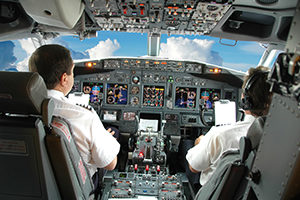 WIT Technology used to make Watt-Ahh can assist in Hydration Respiration under extreme elevational conditions. This chapter focuses on in-flight dehydration risk to both commercial pilots and their passengers.
WIT Technology used to make Watt-Ahh can assist in Hydration Respiration under extreme elevational conditions. This chapter focuses on in-flight dehydration risk to both commercial pilots and their passengers.
Breathing dry cabin air with reduced oxygen and desert-like low humidity, causes considerable water loss in respiration. A 1-2% decrease in total body water content can affect cognition, attention, memory and critical thinking, as well as leading to feelings of tiredness, fatigue and irritability. Studies have shown 2% drop in hydration, despite drinking about ½ liter of water, after being in mimic flight-cabin environment for ten hours (men lost approximately 2 liters of water and women lost approximately 1.6 liters). Rehydration is critical to overcome the body water loss before the next flight, particularly for pilots and their flight crews.
In an environment drier than the Sahara Desert, mucosal membranes also become dehydrated while flying. Blood vessels inside the nose can crack open if not properly hydrated. The body’s defense becomes susceptible to the invasion of bacteria and viruses traveling in the recirculated cabin air, that can cause illness.
Long-term Health Effects in Flight Crews
The cumulative hours in the climate-controlled flight environment cause chronic dehydration for pilots which can lead to long-term health issues. Dr. Walter “Buck” Campbell, DOAM and also a former flight attendant, prepared this report on the results of confidential health surveys from flight personnel sharing both their health concerns and personal experiences. There were relatively high incidences of a large spectrum of health concerns including dry eyes, back pain, depression and chronic fatigue.
The Tiny Water Bottle Ban – San Francisco International Airport
Recently, San Francisco International Airport banned single-use bottled water. The airport assured its passengers that the available water fountains will be routinely sanitized but can that be trusted when used by persons traveling from around the world? It is inadvisable for an athlete to start exercising with a high rate of respiration without being fully hydrated. The same is true for any passenger or pilot going on a flight. One pilot-related cognitive error due to dehydration could endanger many lives. Consequently, the bottled water ban to supposedly reduce the recycling load at an airport seems to be a reckless decision.
There are beverage loopholes in the San Fran ban. Only single-use bottled water has been banned by San Fran Airport (also called “The Tiny Water Bottle Ban”). Kiosks will continue to offer one-liter sized bottled water, and sized-containers of sparking water, flavored water, sodas, coffees, teas, and juices. The ban also does not affect beverages served on the planes.
Botched Water Bottle Ban – University of Vermont
After three years of banning bottled water, University of Vermont (UVM) measured the effectiveness of the ban. The 2015 report commissioned by UVM, was unfavorable towards the ban in reducing waste, and it even reported a 25% increase in sugary beverages sold since the beginning of the ban. Read more.
Our In-flight Recommendations
The following is our recommendations when flying since Watt-Ahh Polarized Water will effectively hydrate to offset dehydration from breathing dry, low oxygen air in the cabin.
- Pack bottles of Watt-Ahh in your check-in bag to drink immediately after the flight and before getting in a car to drive for better mental clarity.
- Drink Watt-Ahh before going through airport security and place the empty bottles into the recycle bin, if available at the airport.
- Fill a spray mister (8 oz. or less) with Watt-Ahh and spray your eyes during flight to alleviate dry eye symptoms.
- Add Watt-Ahh to a saline bottle (8 oz. or less) and spray inside your nostrils during flight.
- Purchase bottled beverages, preferably pure water, to drink during the flight.
- Drink non-alcoholic beverages offered to you in-flight.
- All pilots should routinely drink Watt-Ahh before, during and after flights for better recovery and cognitive support.
- And finally, please try to find recycle bins to toss empty containers if available at airports.
